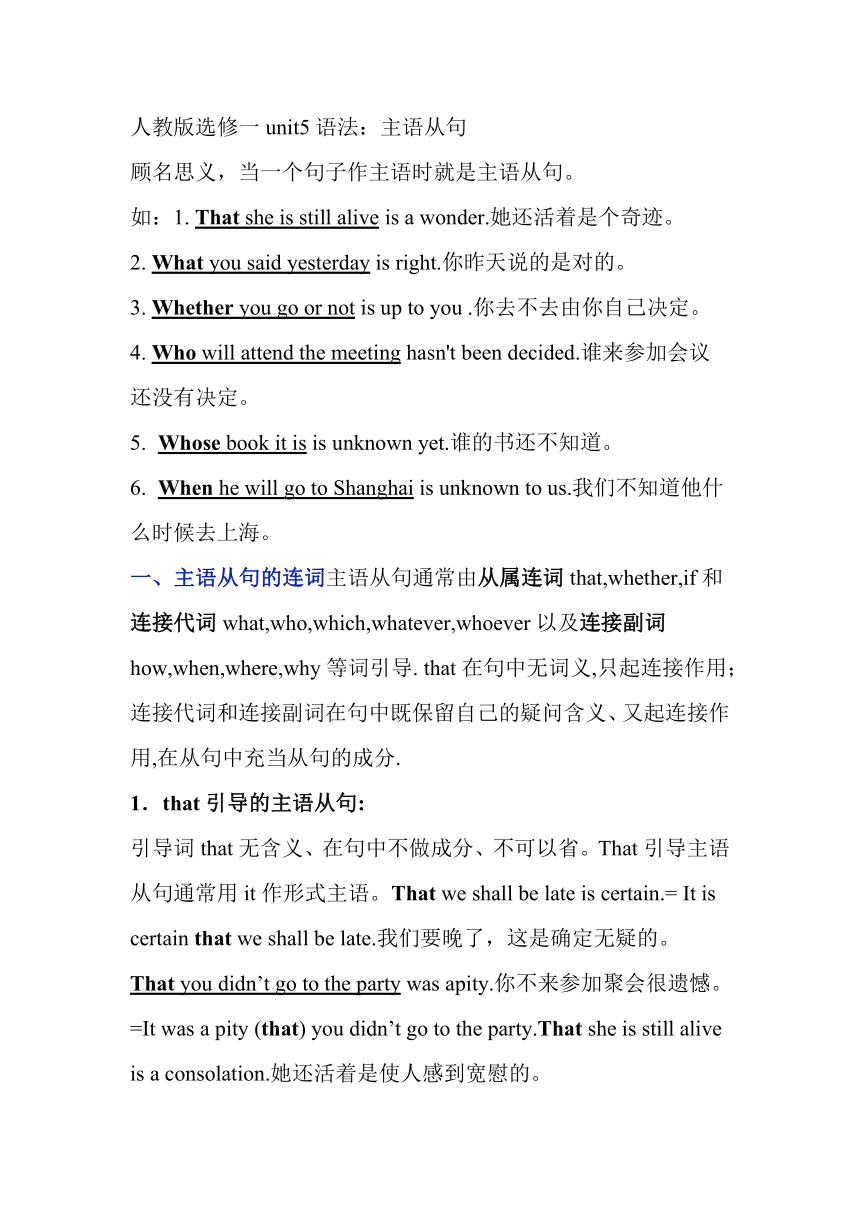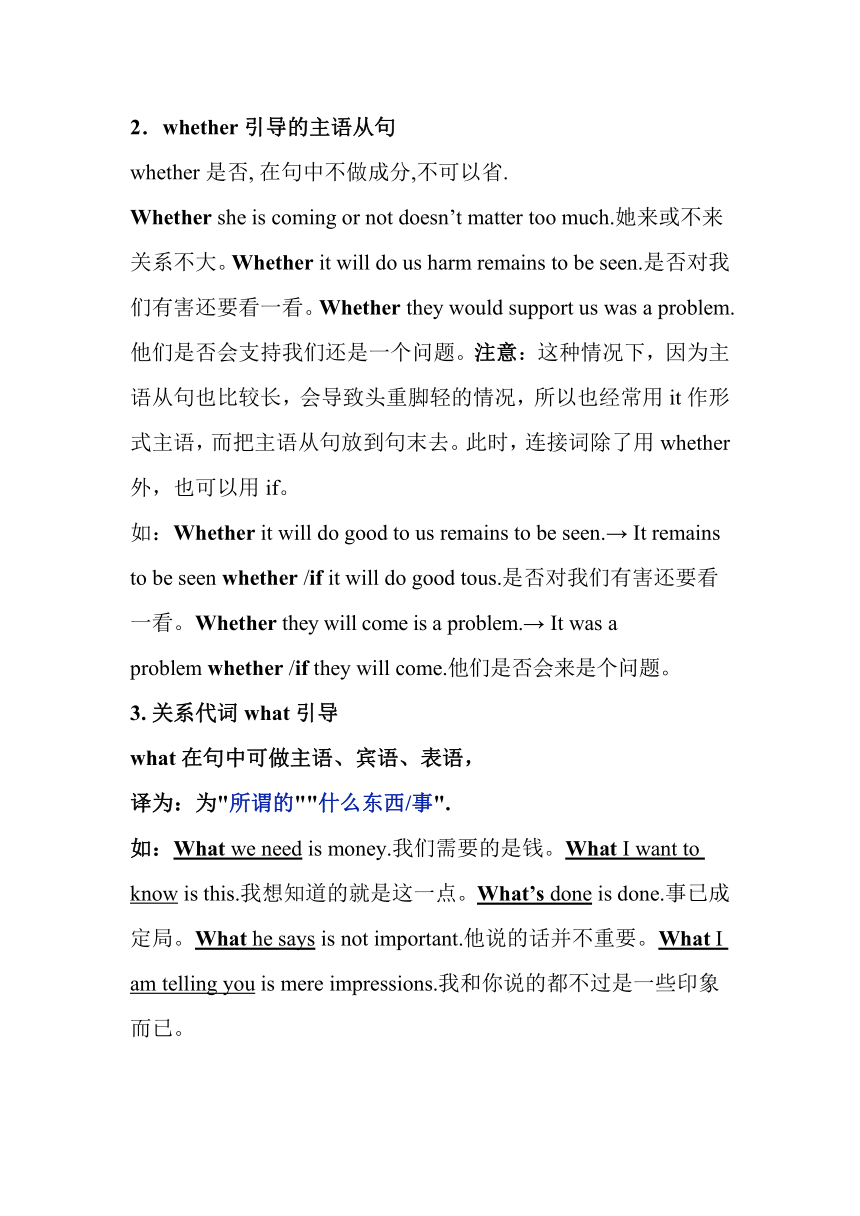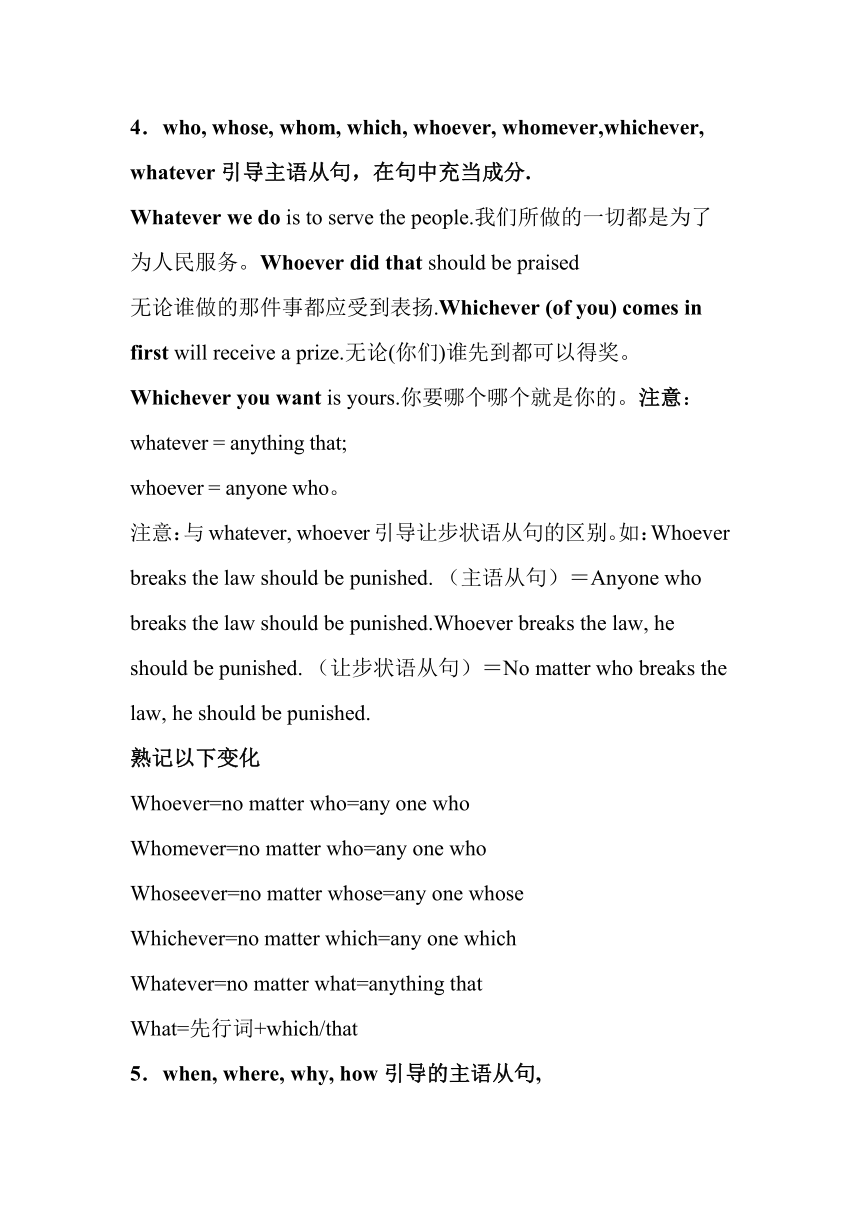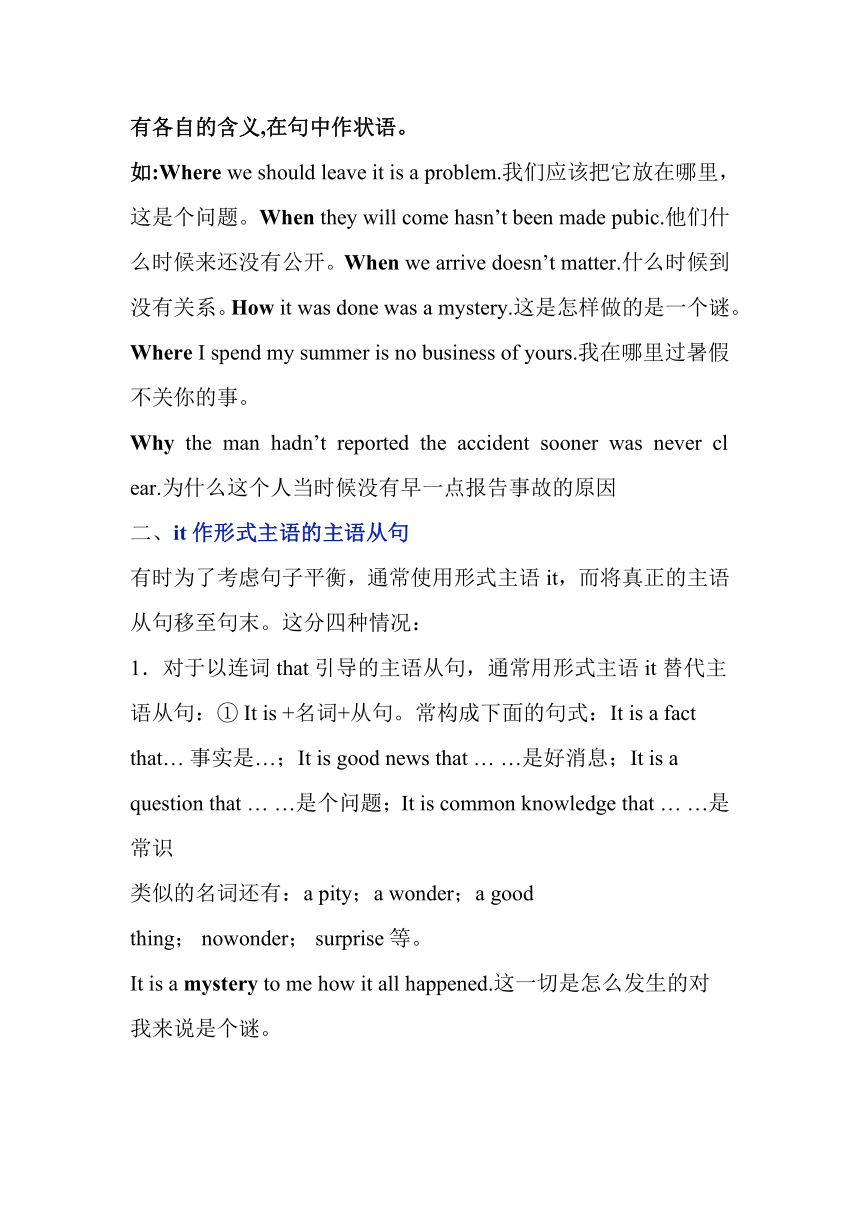人教版(2019)选择性必修 第一册 Unit 5 Working the Land语法学案(含答案)
文档属性
| 名称 | 人教版(2019)选择性必修 第一册 Unit 5 Working the Land语法学案(含答案) |  | |
| 格式 | zip | ||
| 文件大小 | 21.5KB | ||
| 资源类型 | 教案 | ||
| 版本资源 | 人教版(2019) | ||
| 科目 | 英语 | ||
| 更新时间 | 2023-02-13 17:17:34 | ||
图片预览




文档简介
人教版选修一unit5语法:主语从句
顾名思义,当一个句子作主语时就是主语从句。
如:1. That she is still alive is a wonder.她还活着是个奇迹。2. What you said yesterday is right.你昨天说的是对的。3. Whether you go or not is up to you .你去不去由你自己决定。4. Who will attend the meeting hasn't been decided.谁来参加会议还没有决定。
Whose book it is is unknown yet.谁的书还不知道。
When he will go to Shanghai is unknown to us.我们不知道他什么时候去上海。
一、主语从句的连词主语从句通常由从属连词that,whether,if 和连接代词what,who,which,whatever,whoever以及连接副词how,when,where,why等词引导. that在句中无词义,只起连接作用;连接代词和连接副词在句中既保留自己的疑问含义、又起连接作用,在从句中充当从句的成分.
1.that引导的主语从句:
引导词that无含义、在句中不做成分、不可以省。That 引导主语从句通常用it 作形式主语。That we shall be late is certain.= It is certain that we shall be late.我们要晚了,这是确定无疑的。That you didn’t go to the party was apity.你不来参加聚会很遗憾。=It was a pity (that) you didn’t go to the party.That she is still alive is a consolation.她还活着是使人感到宽慰的。
2.whether引导的主语从句
whether 是否, 在句中不做成分,不可以省.
Whether she is coming or not doesn’t matter too much.她来或不来关系不大。Whether it will do us harm remains to be seen.是否对我们有害还要看一看。Whether they would support us was a problem.他们是否会支持我们还是一个问题。注意:这种情况下,因为主语从句也比较长,会导致头重脚轻的情况,所以也经常用it作形式主语,而把主语从句放到句末去。此时,连接词除了用whether外,也可以用if。
如:Whether it will do good to us remains to be seen.→ It remains to be seen whether /if it will do good tous.是否对我们有害还要看一看。Whether they will come is a problem.→ It was a problem whether /if they will come.他们是否会来是个问题。
3. 关系代词what引导
what在句中可做主语、宾语、表语,
译为:为"所谓的""什么东西/事".
如:What we need is money.我们需要的是钱。What I want to know is this.我想知道的就是这一点。What’s done is done.事已成定局。What he says is not important.他说的话并不重要。What I am telling you is mere impressions.我和你说的都不过是一些印象而已。
4.who, whose, whom, which, whoever, whomever,whichever, whatever引导主语从句,在句中充当成分.
Whatever we do is to serve the people.我们所做的一切都是为了为人民服务。Whoever did that should be praised
无论谁做的那件事都应受到表扬.Whichever (of you) comes in first will receive a prize.无论(你们)谁先到都可以得奖。Whichever you want is yours.你要哪个哪个就是你的。注意:whatever = anything that;
whoever = anyone who。
注意:与whatever, whoever引导让步状语从句的区别。如:Whoever breaks the law should be punished. (主语从句)=Anyone who breaks the law should be punished.Whoever breaks the law, he should be punished. (让步状语从句)=No matter who breaks the law, he should be punished.
熟记以下变化
Whoever=no matter who=any one who
Whomever=no matter who=any one who
Whoseever=no matter whose=any one whose
Whichever=no matter which=any one which
Whatever=no matter what=anything that
What=先行词+which/that
5.when, where, why, how引导的主语从句,
有各自的含义,在句中作状语。
如:Where we should leave it is a problem.我们应该把它放在哪里,这是个问题。When they will come hasn’t been made pubic.他们什么时候来还没有公开。When we arrive doesn’t matter.什么时候到没有关系。How it was done was a mystery.这是怎样做的是一个谜。Where I spend my summer is no business of yours.我在哪里过暑假不关你的事。
Why the man hadn’t reported the accident sooner was never clear.为什么这个人当时候没有早一点报告事故的原因
it 作形式主语的主语从句
有时为了考虑句子平衡,通常使用形式主语it,而将真正的主语从句移至句末。这分四种情况:
对于以连词that引导的主语从句,通常用形式主语it替代主语从句:① It is +名词+从句。常构成下面的句式:It is a fact that… 事实是…;It is good news that … …是好消息;It is a question that … …是个问题;It is common knowledge that … …是常识
类似的名词还有:a pity;a wonder;a good thing; nowonder; surprise等。
It is a mystery to me how it all happened.这一切是怎么发生的对我来说是个谜。
It is common knowledge that the whale is not a fish.众所周知,鲸鱼不是鱼。
It is no surprise that Bob should have won the game. 鲍伯竟然赢了这场比赛并不奇怪。
② It is +形容词+从句。常构成下面的句式:It is necessary that … 有必要…It is clear that … 很清楚…It is likely that … 很可能…It is important that … 重要的是…
类似的形容词还有:strange; natural; obvious; true; good; wonderful; possible; unlikely; quite; unusual; certain; evident; worth-while; surprising; interesting; astonishing, etc.
It is doubtful whether she will be able to come.她是否能来还不确定。
It is essential that he should be here by the weekend.他周末应该到这儿来是很重要的。
It seems obvious that we can not go on like this.很显然,我们不能继续这样下去。
It is necessary that you(should) master the computer.你有必要掌握这台计算机。需要注意的是这类主语从句中,谓语动词很多为“(should)+动词原形”,即要用虚拟语气。③ It is +过去分词+从句
It is said that … 据说……;It is reported that … 据报道……;It has been proved that … 已证明……;It must be proved that… 必须指出……
类似的过去分词还有:known; estimated; expected; believed; thought; hoped; noted;discussed; required; decided; suggested; demanded; made clear; found out,etc.
如:It is used to be thought that a new star must be due to a collision between two stars.人们曾经认为,一颗新星一定是由于两颗恒星之间的碰撞造成的。It has not been made clear when the new road is to be opened to traffic.这条新路何时通车还没有弄清楚。
④ It seems不及物动词(happened/ appears / doesn’t’t matter / makes no difference / occurred …)that…主语从句不可提前It makes no difference whether he will attend the meeting or not.他是否参加会议无关紧要。
It does not matter if I missed my train.
我没赶上火车也没关系。
It happened that I saw him yesterday.
碰巧我昨天看见他了。
对于以连接代词(副词)引导的主语从句,可以使用形式主语,也可直接在句首使用主语从句:Whether they would support us was a problem.他们是否会支持我们还是一个问题。It was a problem whether they would support us.他们是否会支持我们还是一个问题。
what引导的主语从句,通常直接放在句首。有时也可用形式主语。如:What we need is money.我们需要的是钱。It is clear enough what he meant.他是什么意思很清楚。
如果句子是疑问句,则必须用带形式主语it的结构:That she is our English teacher is true.她是我们的英语老师,是真的。That he has been there twice is a fact.他去过那儿两次了,是真的。这两句话如果改为一般疑问句时,不能这么改:错误:Is that she is your English teacher true 错误:Is that he has been there twice a fact 而是要改为含有形式主语it的句子:→ Is it true that she is your English teacher → Is it a fact that he has been there twice 又如:Is it true that he is the girl’s father 他是那女孩的父亲,是真的吗?How is it that you are late again 你怎么又迟到了?
连词that的省略问题引导主语从句的连词that 有时可省,有时不能省,其原则是:若that引导的主语从句直接位于句首,则that不能省略;若that引导的主语从句位于句末,而在句首使用了形式主语it,则that可以省略:That you didn’t go to the talk was a pity.很遗憾你没去听报告。(that不可省)It was a pity (that) you didn’t go to the talk.很遗憾你没去听报告。(that可省)
主语从句不可位于句首的五种情况
1.It is said , (reported) …结构中的主语从句不可提前。如:
It is said that President Jingo will visit ourschool next week. (right)
That President Jiango will visit our school next week is said. (wrong)
2. It happens…, It occurs… 结构中的主语从句不可提前。如:
It occurred to him that he failed in the examination. (right)
That he failed in the examination occurred tohim. (wrong)
3.It doesn’t matter how/whether …结构中的主语从句不可提前。如:
It doesn’t matter whether he is wrong or not. (right)
Whether he is wrong or not doesn’t matter. (wrong)
4.含主语从句的复合句是疑问句时,主语从句不可提前。如:Is it likely that it will rain in the evening (right)Is that will rain in the evening likely (wrong)5.If引导的主语从句不能放在句首。It's uncertain if he'll come this evening. (right)
顾名思义,当一个句子作主语时就是主语从句。
如:1. That she is still alive is a wonder.她还活着是个奇迹。2. What you said yesterday is right.你昨天说的是对的。3. Whether you go or not is up to you .你去不去由你自己决定。4. Who will attend the meeting hasn't been decided.谁来参加会议还没有决定。
Whose book it is is unknown yet.谁的书还不知道。
When he will go to Shanghai is unknown to us.我们不知道他什么时候去上海。
一、主语从句的连词主语从句通常由从属连词that,whether,if 和连接代词what,who,which,whatever,whoever以及连接副词how,when,where,why等词引导. that在句中无词义,只起连接作用;连接代词和连接副词在句中既保留自己的疑问含义、又起连接作用,在从句中充当从句的成分.
1.that引导的主语从句:
引导词that无含义、在句中不做成分、不可以省。That 引导主语从句通常用it 作形式主语。That we shall be late is certain.= It is certain that we shall be late.我们要晚了,这是确定无疑的。That you didn’t go to the party was apity.你不来参加聚会很遗憾。=It was a pity (that) you didn’t go to the party.That she is still alive is a consolation.她还活着是使人感到宽慰的。
2.whether引导的主语从句
whether 是否, 在句中不做成分,不可以省.
Whether she is coming or not doesn’t matter too much.她来或不来关系不大。Whether it will do us harm remains to be seen.是否对我们有害还要看一看。Whether they would support us was a problem.他们是否会支持我们还是一个问题。注意:这种情况下,因为主语从句也比较长,会导致头重脚轻的情况,所以也经常用it作形式主语,而把主语从句放到句末去。此时,连接词除了用whether外,也可以用if。
如:Whether it will do good to us remains to be seen.→ It remains to be seen whether /if it will do good tous.是否对我们有害还要看一看。Whether they will come is a problem.→ It was a problem whether /if they will come.他们是否会来是个问题。
3. 关系代词what引导
what在句中可做主语、宾语、表语,
译为:为"所谓的""什么东西/事".
如:What we need is money.我们需要的是钱。What I want to know is this.我想知道的就是这一点。What’s done is done.事已成定局。What he says is not important.他说的话并不重要。What I am telling you is mere impressions.我和你说的都不过是一些印象而已。
4.who, whose, whom, which, whoever, whomever,whichever, whatever引导主语从句,在句中充当成分.
Whatever we do is to serve the people.我们所做的一切都是为了为人民服务。Whoever did that should be praised
无论谁做的那件事都应受到表扬.Whichever (of you) comes in first will receive a prize.无论(你们)谁先到都可以得奖。Whichever you want is yours.你要哪个哪个就是你的。注意:whatever = anything that;
whoever = anyone who。
注意:与whatever, whoever引导让步状语从句的区别。如:Whoever breaks the law should be punished. (主语从句)=Anyone who breaks the law should be punished.Whoever breaks the law, he should be punished. (让步状语从句)=No matter who breaks the law, he should be punished.
熟记以下变化
Whoever=no matter who=any one who
Whomever=no matter who=any one who
Whoseever=no matter whose=any one whose
Whichever=no matter which=any one which
Whatever=no matter what=anything that
What=先行词+which/that
5.when, where, why, how引导的主语从句,
有各自的含义,在句中作状语。
如:Where we should leave it is a problem.我们应该把它放在哪里,这是个问题。When they will come hasn’t been made pubic.他们什么时候来还没有公开。When we arrive doesn’t matter.什么时候到没有关系。How it was done was a mystery.这是怎样做的是一个谜。Where I spend my summer is no business of yours.我在哪里过暑假不关你的事。
Why the man hadn’t reported the accident sooner was never clear.为什么这个人当时候没有早一点报告事故的原因
it 作形式主语的主语从句
有时为了考虑句子平衡,通常使用形式主语it,而将真正的主语从句移至句末。这分四种情况:
对于以连词that引导的主语从句,通常用形式主语it替代主语从句:① It is +名词+从句。常构成下面的句式:It is a fact that… 事实是…;It is good news that … …是好消息;It is a question that … …是个问题;It is common knowledge that … …是常识
类似的名词还有:a pity;a wonder;a good thing; nowonder; surprise等。
It is a mystery to me how it all happened.这一切是怎么发生的对我来说是个谜。
It is common knowledge that the whale is not a fish.众所周知,鲸鱼不是鱼。
It is no surprise that Bob should have won the game. 鲍伯竟然赢了这场比赛并不奇怪。
② It is +形容词+从句。常构成下面的句式:It is necessary that … 有必要…It is clear that … 很清楚…It is likely that … 很可能…It is important that … 重要的是…
类似的形容词还有:strange; natural; obvious; true; good; wonderful; possible; unlikely; quite; unusual; certain; evident; worth-while; surprising; interesting; astonishing, etc.
It is doubtful whether she will be able to come.她是否能来还不确定。
It is essential that he should be here by the weekend.他周末应该到这儿来是很重要的。
It seems obvious that we can not go on like this.很显然,我们不能继续这样下去。
It is necessary that you(should) master the computer.你有必要掌握这台计算机。需要注意的是这类主语从句中,谓语动词很多为“(should)+动词原形”,即要用虚拟语气。③ It is +过去分词+从句
It is said that … 据说……;It is reported that … 据报道……;It has been proved that … 已证明……;It must be proved that… 必须指出……
类似的过去分词还有:known; estimated; expected; believed; thought; hoped; noted;discussed; required; decided; suggested; demanded; made clear; found out,etc.
如:It is used to be thought that a new star must be due to a collision between two stars.人们曾经认为,一颗新星一定是由于两颗恒星之间的碰撞造成的。It has not been made clear when the new road is to be opened to traffic.这条新路何时通车还没有弄清楚。
④ It seems不及物动词(happened/ appears / doesn’t’t matter / makes no difference / occurred …)that…主语从句不可提前It makes no difference whether he will attend the meeting or not.他是否参加会议无关紧要。
It does not matter if I missed my train.
我没赶上火车也没关系。
It happened that I saw him yesterday.
碰巧我昨天看见他了。
对于以连接代词(副词)引导的主语从句,可以使用形式主语,也可直接在句首使用主语从句:Whether they would support us was a problem.他们是否会支持我们还是一个问题。It was a problem whether they would support us.他们是否会支持我们还是一个问题。
what引导的主语从句,通常直接放在句首。有时也可用形式主语。如:What we need is money.我们需要的是钱。It is clear enough what he meant.他是什么意思很清楚。
如果句子是疑问句,则必须用带形式主语it的结构:That she is our English teacher is true.她是我们的英语老师,是真的。That he has been there twice is a fact.他去过那儿两次了,是真的。这两句话如果改为一般疑问句时,不能这么改:错误:Is that she is your English teacher true 错误:Is that he has been there twice a fact 而是要改为含有形式主语it的句子:→ Is it true that she is your English teacher → Is it a fact that he has been there twice 又如:Is it true that he is the girl’s father 他是那女孩的父亲,是真的吗?How is it that you are late again 你怎么又迟到了?
连词that的省略问题引导主语从句的连词that 有时可省,有时不能省,其原则是:若that引导的主语从句直接位于句首,则that不能省略;若that引导的主语从句位于句末,而在句首使用了形式主语it,则that可以省略:That you didn’t go to the talk was a pity.很遗憾你没去听报告。(that不可省)It was a pity (that) you didn’t go to the talk.很遗憾你没去听报告。(that可省)
主语从句不可位于句首的五种情况
1.It is said , (reported) …结构中的主语从句不可提前。如:
It is said that President Jingo will visit ourschool next week. (right)
That President Jiango will visit our school next week is said. (wrong)
2. It happens…, It occurs… 结构中的主语从句不可提前。如:
It occurred to him that he failed in the examination. (right)
That he failed in the examination occurred tohim. (wrong)
3.It doesn’t matter how/whether …结构中的主语从句不可提前。如:
It doesn’t matter whether he is wrong or not. (right)
Whether he is wrong or not doesn’t matter. (wrong)
4.含主语从句的复合句是疑问句时,主语从句不可提前。如:Is it likely that it will rain in the evening (right)Is that will rain in the evening likely (wrong)5.If引导的主语从句不能放在句首。It's uncertain if he'll come this evening. (right)
